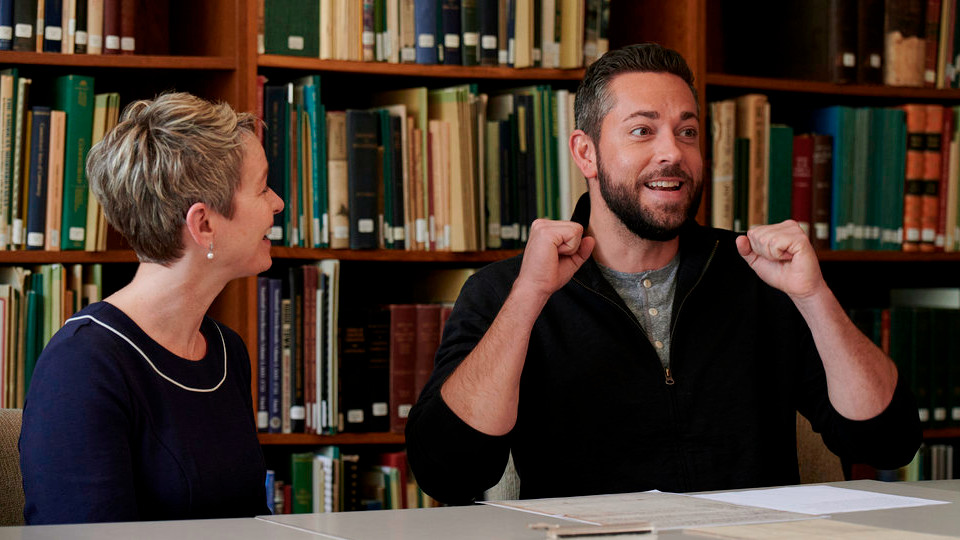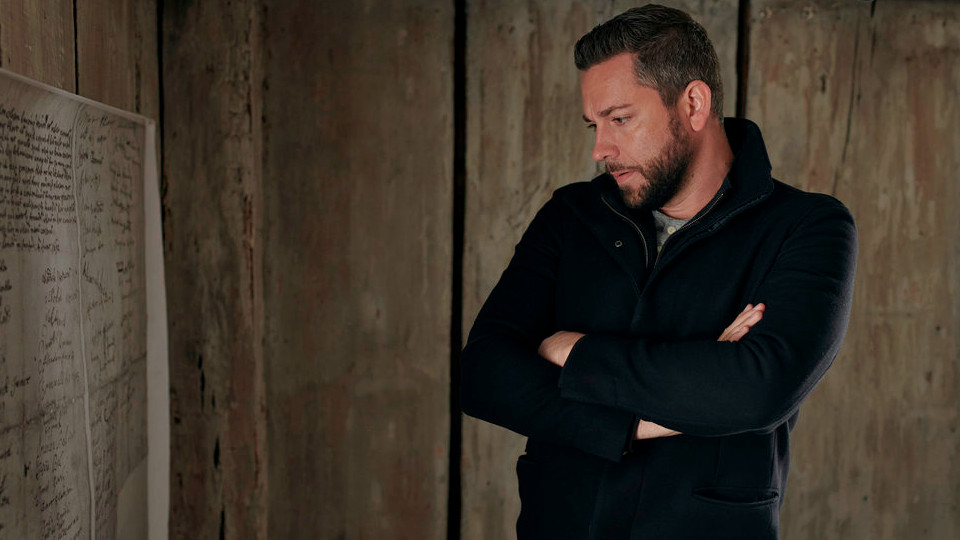Zach Levi Wades Through Painful Family History to Find Hope for the Future in the Latest Who Do You Think You Are?
I’ve been a fan of Zachary Levi’s acting since I got hooked on Chuck. Though he’s had many roles over the years, from Shazam! to Kurt Warner, he’ll always be that nerdy hero in my heart of hearts. Yet, despite my fandom, I didn’t actually know much about the man. Sure, he’s done well for himself, getting nominated for a Tony and having a recurring role on Marvelous Mrs. Maisel. But who he actually was? That was a big old question mark. Or at least it was until this fascinating yet painful episode of Who Do You Think You Are?
Zach’s story begins in his hometown of Ventura, California. His actual name is Zachary Levi Pugh, and from the age of 4, he realized the joy of making people laugh. He wanted to be an entertainer and was in plays and musicals during middle school. He calls himself very nerdy, without an off switch or filter. Despite his talent for humor and obvious skills, this episode is one about a search for redemption. Because Zach had a lot of turmoil hiding in plain sight in his family tree.

When he was only 6, his parents separated and then later divorced. Turns out, his mother had a bad drinking problem that eventually became a pill problem. Though she was an incredibly intelligent woman, she grew up with a psychologically abusive mother. Zach believes that all abuse comes from previous abuse, though he wasn’t sure what exactly made his grandmother abusive towards her children.
By 37, Zachary had been through a tumultuous marriage and divorce of his own, and that very same year his mother died. He had been hurting for a while, feeling like a failure for most of his life. Thankfully he spent time in therapy, and thus was especially grateful for his friends and family who loved and believed in him, allowing him to heal over time. One of those people is his younger sister Shekinah McGlocklin, who helps start his journey through their family tree.
As for why Zach joined Who Do You Think You Are?, it’s mostly due to his belief that dysfunction can be traced through your lineage. As such, understanding it can help change behavior and make better decisions for future generations. With that said, Zach’s maternal side had a lot of dysfunction and pain to sift through first.
The Schencks were of German lineage from St. Louis. Zach’s maternal grandma was named Pat, and his great grandmother was Juliette Jones. By searching newspapers digitally, he finds a sad tale about an ancestor named Henry, and the scandal that impacted his life. Apparently he was promised to a 15 year old Albrecht girl, and then married someone else when he was 23. This was back in the late 1800’s. Back then, the age of consent was only 12, so the controversy here was that he was charged with ‘seduction under promise of marriage’.
Wanting more details, Zach then heads to the St. Louis Public Library, meeting Nick Syrett, a historian of sexuality. Nick helps confirm that the wording of the article likely meant Henry did have sex with the 15 year old before marrying someone else. He also confirms that Henry tried to help the girl abort the pregnancy with some ‘questionable medicine’. Unfortunately for him, abortion was illegal at the time. But it then raises a question of whether Henry married someone else to avoid being forced to marry the younger woman, as opposed to a marriage formed around mutual love and respect.

After looking at some microfilm, Zach finds more proof of the marriage’s weak foundation. An article showed Henry’s wife made him join the army to get rid of him, and later files for a divorce. The marriage overall sounded violent and painful, and Zach laments a pattern of threatening spouses with knives and frying pans. Henry’s wife even had him arrested twice, likely for actual physical violence he did to her.
While Zach was understandably upset by this account, as he was by the fact Henry died of liver failure, he then finds the 13th census of the US. His three times great grandpa Henry G. Schenck was a disabled veteran of the Civil War. But much to Zach’s dismay, this tale didn’t end much better than the last. At the National Archives of D.C., Donna Schuele helps find documentation that Henry G.’s wife Elisabeth filed for half his pension. Henry fought this claim, saying his wife had poor moral character, and spreading tales of drinking and carousing. To Zach’s great surprise, this account is contradicted by Henry’s own children, who say their father was quarrelsome and a heavy drinker to boot. By contrast, they advocate for their mother, who worked as a laundry cleaner to make a meager living.
Here Zach decides to investigate the paternal side of his family tree, the Pughs. He meets with a familiar face, Joseph B. Shumway. They look at a family tree that Joseph helped put together, and find a branch leading to the Clason line, which extends some 10 generations. It leads to Stephen Clawson in the 1600s, and the Puritans. From Ann Little in Fairfield Connecticut, Zach discovers Clawson’s wife was accused of being a witch during the Salem Witch Trials.

To Zach’s pleasant surprise, he discovers Clawson advocated for his wife, and convinced 76 friends and neighbors to sign a petition showing she wasn’t a witch, but was instead a woman of good moral character. This after the court tried to drown her to prove her witchcraft, and were shocked that she floated. Luckily, Stephen Clawson’s attempts pay off, and Elisabeth is one of the very few women to get acquitted. Which helps Zach realize that not all the men of his family tree were bad, and lets him focus on empathy, grace and understanding for past and future.
While Allison Janney was still my Who Do You Think You Are? MVP last week, I appreciated this deep dive into an actor I so enjoy. Be sure and tune back next week for another exciting celebrity guest for the upcoming episode of NBC’s thrilling historical revelations.
